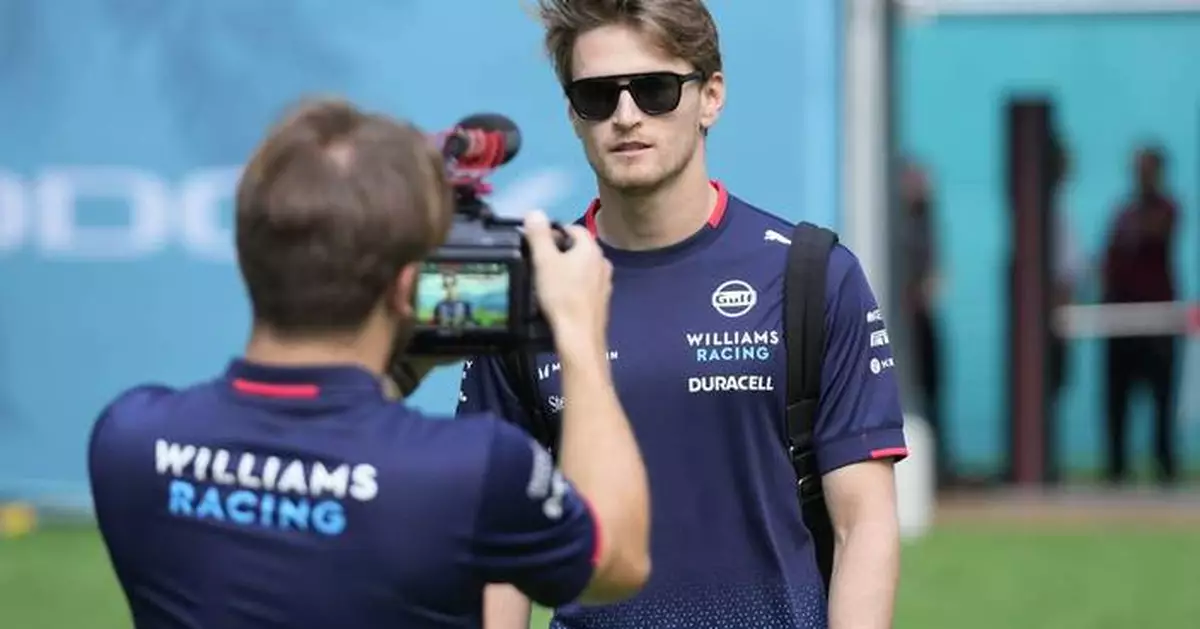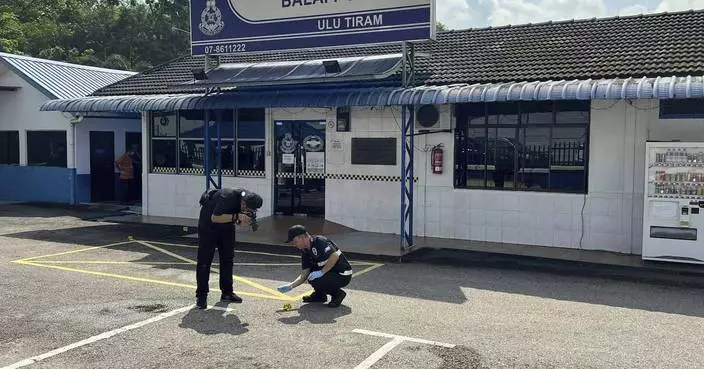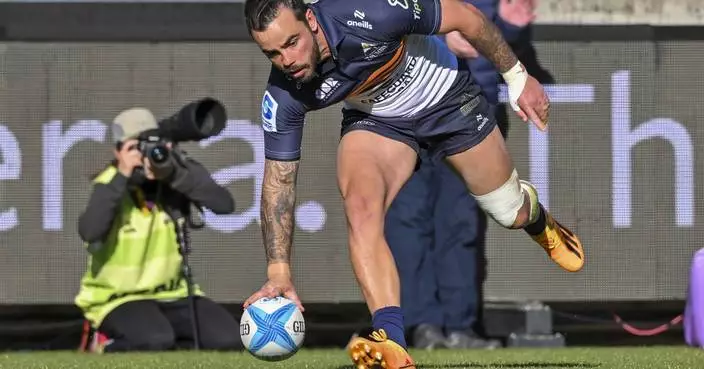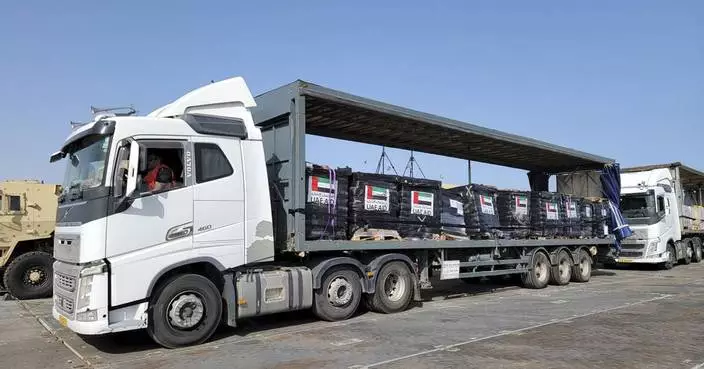MIAMI GARDENS, Fla. (AP) — The only American driver in Formula One had a somewhat decent showing in the Saturday sprint race ahead of the Miami Grand Prix. Then Logan Sargeant totally tanked in qualifying at a time his seat with Williams seems in serious jeopardy.
The sprint race was won by three-time reigning F1 champion Max Verstappen, who is undefeated on the Miami circuit since its 2022 debut. Sargeant was a distant 12th — two spots ahead of Williams teammate Alex Albon.
Come qualifying for Sunday's race, though, Sargeant wound up a distant 17th in the 20-driver field.
“Are we in? Please tell me we are in,” the Floridian radioed his Williams team inquiring to see if he'd advanced out of the first qualifying group. When told he had not, Sargeant replied, “that's a shame.”
Williams team principal James Vowles has said that to keep his seat, Sargeant must elevate his performance to consistently match Albon. Vowles has always been open about the benchmarks set for the 23-year-old from Pompano Beach, but the latest pressure comes as speculation runs rampant that Sargeant could be replaced as soon as the May 19 race at Imola in Italy.
The leading candidate to take Sargeant's seat is Mercedes junior driver Andrea Kimi Antonelli. The 17-year-old Italian competes in F2 and does not yet have the Super License required to compete in an F1 race. Reports have indicated that the FIA has received a request to grant Antonelli a Super License ahead of his 18th birthday in August.
"I’m sure there’s a desire, but I’ll give you my perspective on it: We have far bigger problems to solve than drivers at the moment," Vowles said. "Alex has done championship-level drives and at the moment he’s not scoring points and fundamentally we have it on us to improve our car going forward. That’s my primary concern more than anything else and what we do with drivers going into ’25, ’26.
“In the sense of Kimi, you have to remember it’s just 20 months ago he was in a Formula 4 car," he added. "That’s a large, large step up into a Formula 1 car in such a short space of time.”
Although Williams is one of Mercedes' customers, Vowles said he does not have enough data to rate Antonelli and said he wouldn't be in Sargeant's car at Imola.
“I don’t have any direct communication with Mercedes on how he’s doing in the tests,” Vowles said. “But you can’t really compare in that situation. It’s older cars. I’m not sure if it’s a ’21 or a ’22 car. And there’s nothing really to reference it to.”
Vowles also said his last conversation with Antonelli was at the 2023 season finale in Abu Dhabi. But he seemed adamant that Antonelli will not be replacing Sargeant anytime soon.
“I’ve always said from the beginning, it’s a meritocracy. Logan has to earn his seat. And at the moment, he has some tough targets where he has to get much closer to Alex,” Vowles said. “But there is nothing on the radar at the moment for replacing him.”
Sargeant has missed a race this season because Albon crashed in practice in Australia, Williams didn't have a backup car and so the team gave Sargeant's car to Albon for the race. At the next event in Japan, Sargeant received Albon's repaired car rather than his unscathed own Williams.
Through four of the five races this season, Sargeant has been outqualified by Albon everytime and his best finish has been 14th. He's scored a single point — last year at Austin in his rookie season — through 26 races.
Sargeant, who took a day earlier this week to go boating with family and friends, said he feels relaxed to be racing at home and not buckling to outside speculation.
“Every race in Formula 1 has a lot of pressure behind it. If anything, it just feels like more relaxed weekend, you know, staying at home, being able to eat whatever I want when I’m at home, have my friends, have my parents,” he said. “It just feels a little bit different, different to normal, but in a good way.”
AP F1: https://apnews.com/hub/formula-one

Williams driver Logan Sargeant, of the United States, smiles during a press conference ahead of the Formula One Miami Grand Prix auto race, Thursday, May 2, 2024, in Miami. (AP Photo/Rebecca Blackwell)

Williams drivers Alexander Albon, left, of Thailand and Logan Sargeant of the U.S., speak during an interview ahead of the Formula One Miami Grand Prix auto race at the Miami International Autodrome, Friday, May 3, 2024, in Miami Gardens, Fla. (AP Photo/Wilfredo Lee)

Williams driver Logan Sargeant of the U.S. arrives ahead of the Formula One Miami Grand Prix auto race at the Miami International Autodrome, Friday, May 3, 2024, in Miami Gardens, Fla. (AP Photo/Wilfredo Lee)
RIO DE JANEIRO (AP) — A 20-minute drive separates the historic Maracana Stadium from the Complexo do Alemao, one of Rio de Janeiro's most impoverished and violent favelas.
One of its residents, 15-year-old soccer player Kaylane Alves dos Santos, hopes her powerful shots and impressive dribbles will allow her to cover that short distance from slum to stadium in three years to play for Brazil's national team in the final of the 2027 Women's World Cup.
That chance, once remote, became more realistic on Friday when FIFA members voted to make Brazil the first Latin American country to host the Women's World Cup.
Local organizers have suggested that both the opening match and the final are likely to be played at the 78,000-seat Maracana Stadium that staged the final matches of the 1950 and the 2014 men's soccer World Cups.
Teenager dos Santos knows the hurdles for her to ever play for Brazil remain enormous — in 2027 or later. She doesn't have a professional club to play for, she only trains twice a week, and her nutrition is not the best due to limited food choices in the favela.
Most importantly, she often can't leave home to play when police and drug dealers shoot at each other in Complexo do Alemao.
Still, she is excited and hopeful about Brazil hosting the Women's World Cup, resulting in a big boost to her confidence.
“We have a dream (of playing for Brazil in the Women’s World Cup), and if we have that chance it will be the best thing in the world,” dos Santos told The Associated Press this week after a training session in the Complexo do Alemao.
She and about 70 other young women in the Bola de Ouro project train on an artificial grass pitch in a safe region of the 3-square kilometers long (1.15 square mile) community.
If not on the pitch, Dos Santos and her teammates will be happy enough just to attend games of a tournament they could only dream of watching up close until FIFA members voted for Brazil over the Germany-Netherlands-Belgium joint bid. The Women's World Cup was played for the first time in 1991 and will have its 10th edition in 2027.
A five-time champion in men's soccer, more than any other country, Brazil has yet to win its first Women's World Cup trophy. By then, it is unlikely superstar Marta, aged 38, will be in the roster. Dos Santos and thousands of young female footballers who have overcome sexism to take up the sport are keen to get inspiration from the six-time FIFA player of the year award winner and write their own history on home soil.
As many female footballers experience in Brazil, dos Santos and her teenage teammates rarely play without boys on their teams. Until recently, they also had to share the pitch with five-year-old girls, which didn't allow the older players to train as hard as they would like.
“(The Women's World Cup in Brazil) makes us focus even more in trying to get better. We need to be able to play in this,” said 16-year-old Kamilly Alves dos Santos, Kaylane's sister and also a player on the team. “We need to keep training, sharing our things."
Their team, which has already faced academy sides of big local clubs like Botafogo, is trained by two city activists who once tried to become players themselves.
Diogo Chaves, 38, and Webert Machado, 37, work hard to get some of their players to the Women's World Cup in Brazil, but if that's not possible they will be happy by keeping them in school.
Their non-profit group is funded solely by donations.
“At first, basically, the children wanted to eat. But now we have all of this,” said Chaves, adding that the project began three years ago. “We believe they can get to the national team. But our biggest challenge is opportunity. There's little for children from here, not only for the girls.”
Machado said the two coaches “are not here to fool anyone” and do not believe all the young women they train will become professionals.
“What we want from them is for they to be honest people, we all need to have our character,” Machado said. “We want to play and make them become nurses, doctors, firefighters, some profession in the future."
The two dos Santos sisters, as do many of their teammates, believe that reaching the Women's World Cup as Complexo do Alemao residents is possible. Brazil has more than 100 professional women's soccer teams, with other players living in favelas, too.
But it won't be easy.
“Sometimes I have to cancel appointments because of shootings, because there’s barricades on fire,” she said. “Sometimes police tell us to go back home, they say we can’t come down and point their guns to me, to my mother,” said Kamilly.
Her sister hopes the pair will overcome the violence, against the odds.
“I want to earn my living in soccer, fulfill all dreams," Kaylane says. "And I want to leave the Complexo do Alemao. I want to make it happen.”
AP soccer: https://apnews.com/hub/soccer

An overhead view of the pitch where young women take part in a soccer training session run by the Bola de Ouro social program at the Complexo da Alemao favela in Rio de Janeiro, Brazil, Thursday, May 16, 2024. (AP Photo/Silvia Izquierdo)

Agatha smiles during a soccer training session run by the Bola de Ouro social program, at the Complexo da Alemao favela in Rio de Janeiro, Brazil, Thursday, May 16, 2024. Young women are participating in soccer programs led by community trainers, where they receive both sports and personal development training. (AP Photo/Silvia Izquierdo)

Agatha strikes a ball during a soccer training session run by the Bola de Ouro social program, at the Complexo da Alemao favela in Rio de Janeiro, Brazil, Thursday, May 16, 2024. Young women are participating in soccer programs led by community trainers, where they receive both sports and personal development training. (AP Photo/Silvia Izquierdo)

Young women ready breakfast for fellow participants as part of a soccer training session run by the Bola de Ouro social program, at the Complexo da Alemao favela in Rio de Janeiro, Brazil, Thursday, May 16, 2024. Young women are participating in soccer programs led by community trainers, where they receive both sports and personal development training. (AP Photo/Silvia Izquierdo)

Relatives watch a soccer training session for young women run by the Bola de Ouro social program at the Complexo da Alemao favela in Rio de Janeiro, Brazil, Thursday, May 16, 2024. Young women are participating in soccer programs led by community trainers, where they receive both sports and personal development training. (AP Photo/Silvia Izquierdo)

Young women and their coach Dioguinho bring it in for a team huddle at the start of a soccer training session run by the Bola de Ouro social program, at the Complexo da Alemao favela in Rio de Janeiro, Brazil, May 16, 2024. Young women are participating in soccer programs led by community trainers, where they receive both sports and personal development training. (AP Photo/Silvia Izquierdo)


















